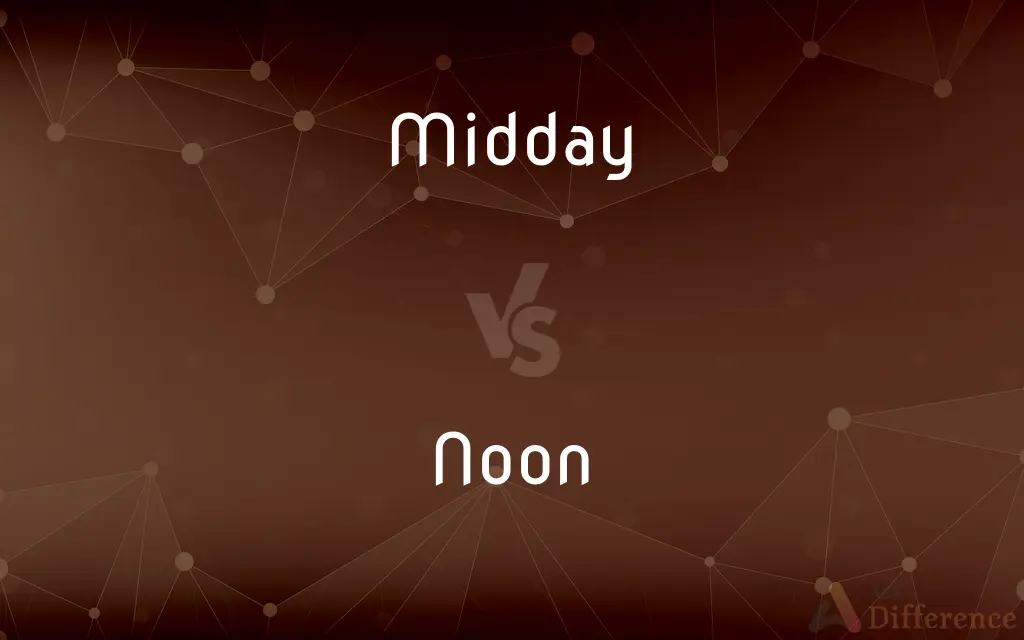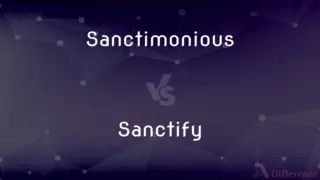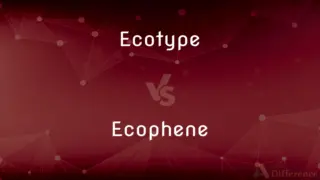Midday vs. Noon — What's the Difference?
By Tayyaba Rehman — Updated on October 30, 2023
Midday refers to the middle of the day, often around noon. Noon precisely denotes 12:00 PM, marking the transition from morning to afternoon.

Difference Between Midday and Noon
Table of Contents
ADVERTISEMENT
Key Differences
Midday and Noon are terms that both refer to a specific time during the day. However, they are used in slightly different contexts. While Midday broadly references the middle part of the day, Noon specifically pinpoints the exact moment when the clock strikes 12:00 PM.
The concept of Midday can be a bit more flexible than that of Noon. For instance, when someone mentions that they'll do something around Midday, they might not strictly mean at 12:00 PM, but rather a timeframe close to it. Conversely, when referring to Noon, it is a precise indication of 12:00 PM.
From a linguistic standpoint, Midday can also be used to describe the general ambiance or characteristics of the middle of the day, such as the Midday sun or the Midday heat. Noon, being a more specific term, is less often used in such descriptive capacities.
Historically and culturally, Noon has been significant as it often marks the time for certain rituals, practices, or breaks, like the Noon prayer in some religions or a lunch break in many work cultures. Midday, being broader, might encompass a wider range of activities or events that happen around the middle of the day.
In conclusion, while both Midday and Noon relate to a similar time of day, Midday has a more flexible and general connotation, whereas Noon is exact and specific.
ADVERTISEMENT
Comparison Chart
Specificity
General time around the middle of the day
Precisely 12:00 PM
Flexibility
Can indicate a range of time near 12:00 PM
Fixed time
Descriptive Usage
Used to describe characteristics of midday (e.g., heat)
Less commonly used descriptively
Cultural Significance
Encompasses events around the middle of the day
Often marks specific rituals or breaks
Example
"Let's meet around midday."
"The event starts at noon."
Compare with Definitions
Midday
The period close to 12:00 PM.
She usually takes her break around midday.
Noon
The exact time when the sun is overhead in some locations.
The shadows are shortest at noon.
Midday
The middle part of the day.
We decided to have our picnic at midday.
Noon
Precisely 12:00 PM during the day.
I'll see you at noon tomorrow.
Midday
The highest sun position in the sky.
The midday sun can be very intense in the tropics.
Noon
The midpoint of the day.
The bells ring at noon.
Midday
The time around the middle of the day.
The sun was blazing during midday.
Noon
Noon (or midday) is 12 o'clock in the daytime. It is written as 12 noon, 12 p.m.
Midday
The central part of the daytime.
The streets are less crowded during midday.
Noon
Twelve o'clock in the daytime; midday.
Midday
The middle of the day; noon.
Noon
The time or point in the sun's path at which the sun is on the local meridian. Also called noontide, noontime.
Midday
Noon; twelve o'clock during the day
Noon
The highest point; the zenith.
Midday
The middle part of the day; noon.
Noon
(Archaic) Midnight.
Midday
Of or pertaining to noon; meridional; as, the midday sun.
Noon
The time of day when the sun is in its zenith; twelve o'clock in the day, midday.
On Sundays, I love to have a lie-in until noon.
The race is due to start at noon sharp.
Midday
The middle of the day
Noon
The corresponding time in the middle of the night; midnight.
Noon
(obsolete) The ninth hour of the day counted from sunrise; around three o'clock in the afternoon.
Noon
(figurative) The highest point; culmination.
Noon
To relax or sleep around midday
Noon
No. See the Note under No.
Noon
Belonging to midday; occurring at midday; meridional.
Noon
The middle of the day; midday; the time when the sun is in the meridian; twelve o'clock in the daytime.
Noon
Hence, the highest point; culmination.
In the very noon of that brilliant life which was destined to be so soon, and so fatally, overshadowed.
Noon
To take rest and refreshment at noon.
Noon
The middle of the day
Noon
The moment marking the transition from morning to afternoon.
By noon, he had already completed most of his tasks.
Noon
A time for specific rituals or breaks in some cultures.
He takes a short rest at noon.
Common Curiosities
Can I use Midday to mean exactly 12:00 PM?
While it's understood, "Noon" is more accurate for 12:00 PM.
Can Midday refer to the early afternoon?
It can, as it broadly references the middle part of the day.
Are Midday and Noon synonymous?
While related, Midday is more general, and Noon is precisely 12:00 PM.
Is Noon always 12:00 PM everywhere?
Yes, Noon is universally 12:00 PM, but actual solar noon might differ.
Is there a "midnight" equivalent for Noon?
Yes, Midnight is to 12:00 AM as Noon is to 12:00 PM.
Do both terms have historical or cultural significance?
Noon often does due to rituals or breaks. Midday is more general.
Is "Noon" ever used to describe attributes like "Midday sun"?
Less commonly. "Midday" is more often used descriptively.
Can Midday mean the hottest part of the day?
Often, yes, especially in contexts referencing the midday sun or heat.
Why is Noon called Noon?
It derives from Latin "nona hora," the ninth hour after dawn.
Are there any idioms involving Midday or Noon?
Phrases like "the noon of life" might symbolize a peak or midpoint.
When are shadows shortest?
Usually around solar noon, when the sun is highest in the sky.
Can I say "12:30 PM is midday"?
It's understood, but Noon is strictly 12:00 PM.
Do other languages have distinct words like Midday and Noon?
Many do, reflecting the significance of this time of day.
Is there a term for the exact time when the sun is overhead?
That's called "solar noon," which can differ from 12:00 PM.
Is "12 PM" the same as Noon?
Yes, 12 PM is another way to indicate Noon.
Share Your Discovery

Previous Comparison
Sanctimonious vs. Sanctify
Next Comparison
Ecotype vs. EcopheneAuthor Spotlight
Written by
Tayyaba RehmanTayyaba Rehman is a distinguished writer, currently serving as a primary contributor to askdifference.com. As a researcher in semantics and etymology, Tayyaba's passion for the complexity of languages and their distinctions has found a perfect home on the platform. Tayyaba delves into the intricacies of language, distinguishing between commonly confused words and phrases, thereby providing clarity for readers worldwide.














































